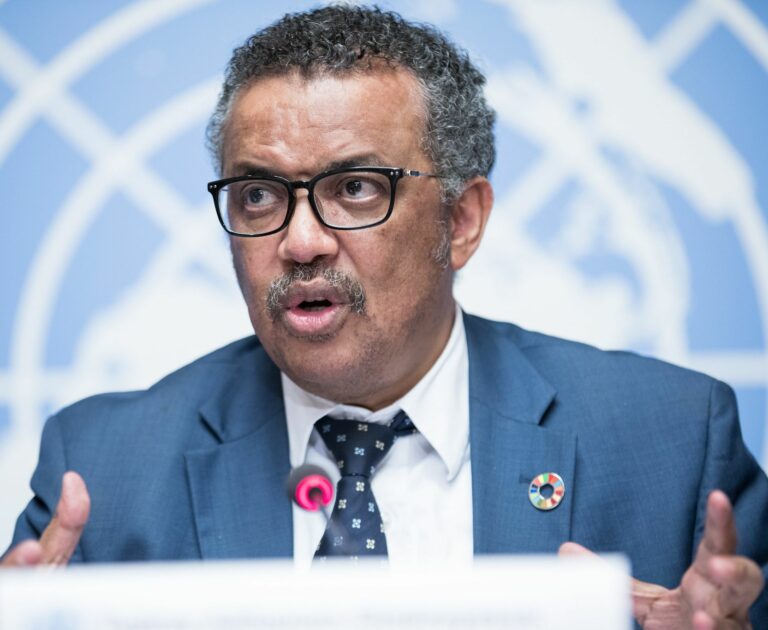Pandemic Accord/new international instrument
- Founded
- Work in progress.
- Governance
- World Health Assembly (WHA) of the World Health Organization (WHO).
- Funding
- Not applicable.
- Description
The Covid-19 pandemic demonstrates how current international frameworks, including the International Health Regulations, fall short in prevention and control of public health emergencies of international concern. In response, global leaders and international agencies called for a new international instrument for strengthening prevention, preparedness and response to those emergencies. The objective is to build a more robust global health architecture that will protect future generations, enhancing the surveillance of and resilience to health threats, access to medical products, mutual trust between countries and implementation of countermeasures.
At a special session of the WHA in 2021, WHO member states decided to establish an intergovernmental negotiating body (INB) to identify substantive elements and develop a working draft of a WHO convention, agreement or other international instrument, referred to as ‘Pandemic Accord’.
On 1 February 2023, the INB published its ‘zero-draft’ of the accord. This is the starting point for the negotiations between the WHO member states. After the fifth meeting of the INB in April 2023, it will present a first draft of the accord, which will be discussed by the member states at the 6th INB meeting in July 2023. The aim is to present the final text of the accord for approval during the 77th WHA in 2024.

Strengths
- Can strengthen political commitment by involving the highest level of global governance.
- Broadens the scope of pandemic preparedness and response beyond the health sector.
- Through provisions on conditions to public funding for health innovations, the instrument can contribute positively to for instance global production capacity and equal distribution of these products, and thus enhance global access.
- Can fill gaps in the current legal framework, for instance on how intellectual property rights for medical products would apply during public health emergencies of international concern.
- Can adopt an approach to funding for pandemic preparedness and response that is more equitable, predictable and sustainable, and draws from a multilateral facility to which all countries contribute based on an agreed ‘ability to pay’ formula, with allocations based on need.
Weaknesses
- Risk of a weak instrument that does not address the most relevant matters, e.g. potential lack of provisions on equity and sharing of data, know-how and intellectual property regarding medical products.
- Risk of an instrument that pushes further private financing of healthcare instead of calling for international collaboration to strengthen domestic public resources.
- The legal status of the new instrument is still not fully defined and, therefore, its applicability and impact remain uncertain.
- Risk of further fragmentation of the international governance system, which can lead to less effective outbreak-management.
- It is particularly difficult for resource-limited countries to engage in negotiations whilst they cope with the Covid-19 aftermath and other crises.
- Enforcement requires political will, which is not apparent everywhere.
Review
The negotiations on the new instrument will be lengthy, which is unavoidable for an inclusive and thorough process. However, the impact of Covid-19 is still felt, and now combines with that of other – pre-existing and newly emerged – crises (financial, war-related and food) that deepen long-time inequalities. Reforms are needed urgently to effectively deal with the current and future pandemics and other – often related – threats. These are reforms in areas such as finance, intellectual property rights protection, and transfer of know-how and technology for key medical products. It is important that these reforms are not stalled in the Pandemic Accord process, but are soon addressed in other policy processes, e.g. at the United Nations and World Trade Organization.
In relation to the content of the Pandemic Accord, an advantage of this newly established pandemic preparedness instrument is the broad scope it could encompass. It can accommodate recognized omissions of the current framework and include agreements with relation to equity, equality, health systems strengthening, trade (and intellectual property), and the One Health approach (recognizing the interconnection between the health of humans, animals and our environment).
A successful new instrument should be strongly rooted in a human rights approach, enshrine an approach to funding that is fair and sustainable, and include provisions that diminish health risks globally and magnify equal access to medical products.
Among them we recommend clauses on conditions to public funding for the research and development (R&D) of medical products, technology transfer to maximise production capacity, transparency regarding pricing, and options to remove intellectual property barriers to ensure the instrument has optimal impact. It should adopt an approach to funding for pandemic preparedness and response that is based on fair share financing where countries contribute according to ability to pay and allocations are based on need.
As mentioned above, reforms in these areas are urgent, and countries must not postpone action. These reforms can and must be tackled sooner rather than later, and can be supported in due time by this new international instrument.
Please read our assessment of the zero-draft of the Pandemic Accord on the Wemos website.
More info
Wemos’ call for a meaningful Pandemic Accord
G2H2 report ‘The politics of a WHO pandemic treaty in a disenchanted world’
G2H2 report ‘Financial Justice for Pandemic Prevention, Preparedness and Response’
Information from the intergovernmental negotiating body
Draft report WHO working group on strengthening pandemic preparedness and response